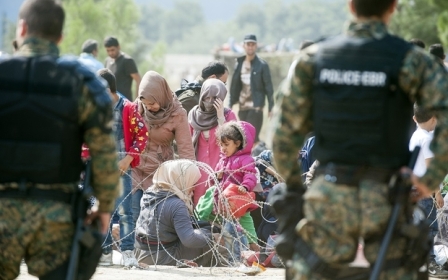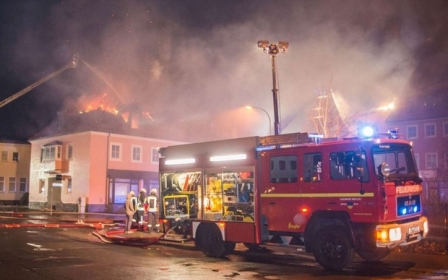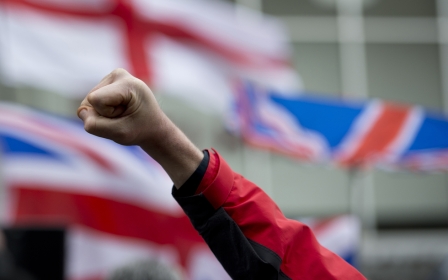Europe's far right: Today they march, but organised violence could be next

Last Saturday, in what has become an annual gathering of European far-right groups, an estimated 60,000 ultranationalists, white supremacists, and neo-Nazi sympathisers marched on Poland’s capital city to mark the 99th anniversary of Polish independence.
The hyper-xenophobic protest that took place in Warsaw succeeded in holding a mirror to the undercurrents of hyper-nationalistic fear and hate in our own societies
Banners promised a "white Europe", while tens of thousands chanted declarations of “clean blood” and “death to the enemies of the homeland.” (CNN and other media including this column had to correct an earlier report that said a banner calling for an Islamic holocaust was carried during the march.)
Between Fascism and Nazism
Poland's government, however, led by the right-wing Law and Justice Party, described the rally as a "beautiful sight", defending the protesters as "patriotic", thus rewarding and empowering the organisers of the mass demonstration, which include anti-Muslim and anti-Jewish extremist groups – the National-Radical Camp, National Movement, All Polish Youth, among others.
These groups have been described as occupying a space between fascism and Nazism. While each are founded on a platform that promotes rabid anti-Semitism and anti-immigrant prejudice, each have become markedly more anti-Muslim in the years since the Syrian refugee crisis began in 2012.
These groups, particularly All Polish Youth, are inextricably tied to the country's ruling Law and Justice party, with the former chairman of the far right extremist group making his way to the office of the vice presidency in 2006.
We know from modern history, though, that from far right populism comes far right militancy
With government invocations of God, racial purity, patriotic slogans and reconstructed historical narratives, Poland has become what a Breitbart website, the US far right publication whose former editor-in-chief became Trump’s campaign manager, would look like were it to come to life.
It’s thus little wonder then that Trump, in his first overseas trip as US president, praised Poland as a "defender of the West", and in doing so, reengineered Samuel Huntington’s widely refuted "Clash of Civilizations” thesis, thus positing the West to be locked in a war against Islam.
While the natural tendency is to recoil and gasp in horror at scenes that invoke memories of Europe's darkest hours, the hyper-xenophobic protest that took place in Warsaw over the weekend succeeded in holding a mirror to the undercurrents of hyper-nationalistic fear and hate in our own societies.
"Patriotism used to be about the spirit of inclusion," observes Shree Paradkar. "Now, the far right – even in Canada – has made it about exclusion and white supremacy."
Imagined communities
Until the Treaty of Westphalia in 1648, which gave birth to the notion of the modern secular nation state, rulers mobilised religious identity to defend their self-interests and legitimise imperialistic plunder.
But when fiefdoms and kingdoms gave way to the nation state, rulers needed an ideology that would motivate its citizens of varying ethnicity to both pay taxes and volunteer for the military. That ideology is nationalism.
In short, nationalism created "imagined communities” where there were once none, and it was nationalistic fervour that fuelled the two world wars of the 20th century.
But the end of the Cold War, however, led many analysts to ponder and speculate that the modern forces of globalisation may bring about an end to the very idea of the nation state, hypothesising that modern means of communication, transport, and economic markets would usher in a borderless world, one in which increased migratory patterns would result in less deference to the state.
Well, those predictions have turned out wrong. Way wrong. Instead, globalisation, a term often used to conceal the universalisation of the US-led neoliberal economic project, otherwise known in shorthand as "trickle down economics", has outsourced working-class manufacturing jobs to the Global South and in-sourced working-class service jobs to immigrants from the Global South.
Essentially, the forces of globalisation have created economic winners and losers everywhere, with the losers well aware of their perceived inequality thanks to the modern means of communication. Global economic grievance has helped mobilise Salafi-Jihadists in the Global South and far-right ultranationalists in the Global North, which is where we find ourselves today.
So instead of witnessing the demise of the nation state, we are seeing Western democratic states retreat from the globalised multicultural experiment, and move towards hyper-nationalistic sentiments not seen on such a level since the rise of fascism in the early to mid-20th century. In the case of Eastern Europe, multiculturalism was never embraced and has now became a symbol of everything that the nationalist right despises.
This undercurrent has produced seismic political shifts in the past year or so. Britain has voted to leave the European Union, America voted for Trump’s far right, anti-immigrant platform, far-right political parties have seized a significant share of European political power, and, of course, 60,000 ultranationalists and white supremacists marched on Warsaw over the weekend.
Far right populism
Ultranationalist, far right parties have gained enormous ground throughout Europe and the United States, and "all have managed to appeal to voters who believe that liberalisation, globalisation and cosmopolitanism have gone too far and who fear the extinction of their culture," writes Julia Ebner, author The Rage: The Vicious Circle of Islamist and Far-Right Extremism.
At the heart of this worldwide trend towards far right ultra-nationalism are negative attitudes towards Muslims. Brexit campaigners warned that if the UK didn't leave the EU, its shores would be hit with a deluge of Turkish immigrants and Muslim refugees.
Trump promised to ban Muslims from entering the United States. Marine Le Pen and Geert Wilders almost secured unlikely electoral victories in France and The Netherlands, respectively, by claiming Islam is antithetical to democratic values.
We know from modern history, though, that from far-right populism comes far-right militancy. A spike in hate crimes against Muslims in Europe and the United Kingdom not only speaks to that, but also to the fact that far right, anti-Muslim military-style training camps are now being set up across Europe, with one group now boasting chapters in France, Italy, Germany and Austria.
"Embracing violent, total solutions is only taking it one step further," warns Ebner, inferring that a return of the unthinkable is not so unimaginable in today's Europe, especially so when protests involving neonazis are described by the government of a modern European country as "patriotic".
- CJ Werleman is the author of Crucifying America (2013), Koran Curious (2011), and he is the host of Foreign Object. Follow him on twitter: @cjwerleman
The views expressed in this article belong to the author and do not necessarily reflect the editorial policy of Middle East Eye.
Photo: Demonstrators burn flares and wave Polish flags during the annual march to commemorate Poland's National Independence Day in Warsaw on 11 November 2017. (AFP)
Correction: The headline of this article and the text were changed to remove the claim that protesters in Warsaw carried a banner saying 'Praying for an Islamic Holocaust'. This banner was photographed at a 2015 far right protest in Poland.
Stay informed with MEE's newsletters
Sign up to get the latest alerts, insights and analysis, starting with Turkey Unpacked
Middle East Eye delivers independent and unrivalled coverage and analysis of the Middle East, North Africa and beyond. To learn more about republishing this content and the associated fees, please fill out this form. More about MEE can be found here.






